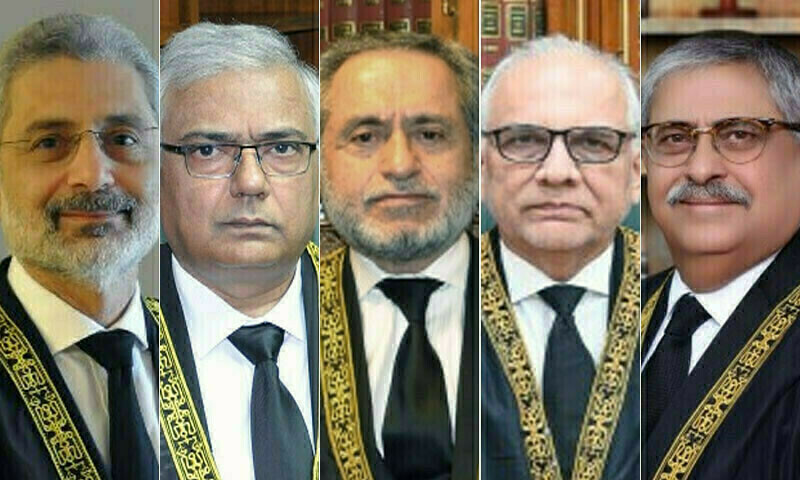The Supreme Court on Friday restored changes to the country’s anti-graft laws as it accepted appeals filed by the federal government and others against the court’s Sept 15 verdict, which struck down those amendments.
Chief Justice of Pakistan (CJP) Qazi Faez Isa pronounced the verdict.
The verdict had been reserved by a five-member bench on June 6 after hearing intra-court appeals (ICAs) filed by the federal government and other parties.
The September 2023 verdict had been issued by a three-member bench comprising then-CJP Umar Ata Bandial, Justice Ijazul Ahsan and Justice Syed Mansoor Ali Shah on PTI founder Imran Khan’s 2022 petition challenging the changes introduced by the then-PML-N-led government.
However, a month later, the apex court had been seized with a number of ICAs — moved by the federal government as well as by a private citizen Zuhair Ahmed Siddiqui, who was an accused in a corruption case but not a party to the challenges to the NAB amendments case.
Hearings on the matter in May had seen the judges debate whether to live-stream the case (as done on May 14) or not, before finally deciding against live broadcast due to concerns about the facility being politically misused.
Previous hearing
On June 6, the five-member bench had reserved its ruling on the federal government’s intra-court appeal against the Sept 15 majority judgement that ruled amendments to the National Accountability Ordinance (NAO) illegal.
Justice Jamal Khan Mandokhail had observed that there was no denying the fact that NAB had always been abused against the elected representatives but the remedy to rectify this misuse did not lie with the courts but with the political leaders.
Justice Athar Minallah had noted that NAB amendments do not mean that corruption cases have come to an end rather references will be forwarded to relevant courts established under relevant laws.
The court had also taken exception to the NAB report, in which it showed the recovery of $10 billion in the head of Reko Diq and asked the NAB additional prosecutor general (APG) whether this statement was “honest or dishonest”.
NAB case history
The amendments made several changes to the National Accountability Ordinance (NAO) 1999, including reducing the term of the NAB chairman and prosecutor general to three years, limiting NAB’s jurisdiction to cases involving over Rs500 million, and transferring all pending inquiries, investigations, and trials to the relevant authorities.
Subsequently, Imran had moved the apex court against the amendments, claiming that the changes to the NAB law were made to benefit the influential accused persons and legitimise corruption.
The petition had pleaded that the fresh amendments tend to scrap corruption cases against the president, prime minister, chief ministers and ministers and provide an opportunity to the convicted public office-holders to get their convictions undone.
In September 2023, after 53 hearings, the SC announced its 2-1 verdict, ordering the restoration of corruption cases against public office holders that were withdrawn due to the amendments and declaring Imran’s plea to be maintainable.
The next month, a five-judge SC bench took up intra-court appeals (ICAs) against its Sept 15 judgment and stopped accountability courts from issuing a final verdict in graft cases.
However, CJP Isa had hinted that the proceedings could be started afresh if the counsel managed to “make a solid case” for the same, as earlier proceedings did not satisfy the requirements of the Supreme Court (Practice and Procedure) Act 2023.
The SC then resumed hearing the ICAs on May 14, with Imran attending the subsequent hearings via video link as per court orders since he was a petitioner in the case.







